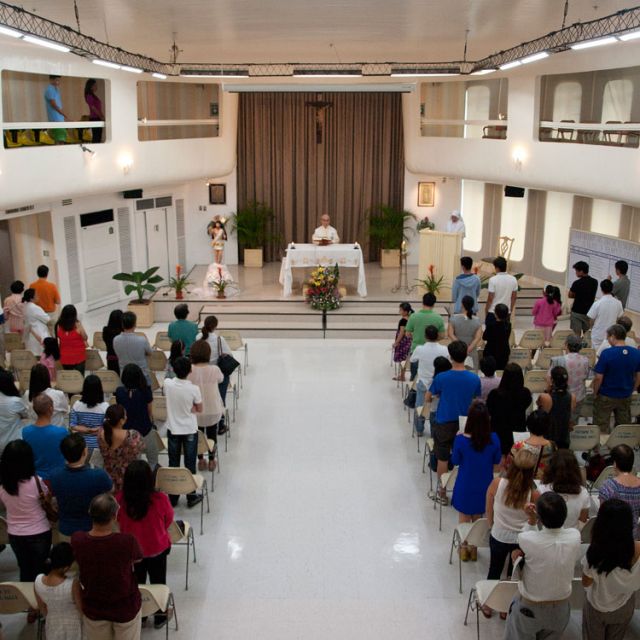On a recent Sunday, the spillover crowd stood in the corridor next to the escalators, some with their heads turned to an overhead video monitor. On the screen, the large wooden crucifix inside the chapel was a prominent backdrop for the priest praying at the altar; sound was piped to the spillover crowd through a loudspeaker. Some attendees were reading and sending text messages, while shoppers strolled past.
Liam McGeonn stared intently at the screen. The 32-year-old from Ireland recently moved to Manila for his job, and this was the second mall he had been to for Mass.
In the Philippines is "the first time I've ever seen it ... so it's unusual. But if you go to Mass, it doesn't really matter where it is, for me it's just Mass," McGeonn told Catholic News Service afterward.
Father Estelito Villegas, mall chaplain, said in the predominantly Catholic Philippines, having Mass literally anywhere is not uncommon because "in the Filipino consciousness, spiritual life is very important."
Combine that feeling with a desire for convenience and that finds Mass being celebrated in places such as shopping malls, he said.
"They attend Mass as a family," the priest explained. "So it would mean fulfilling their Sunday obligation. Then they have their family day. So they eat together, maybe they shop, they recreate. ... That's it. A one-stop shop, maybe."
But it's not just malls that draw the crowds. Makati Medical Center has regular Sunday Mass-goers. Franciscan Father Jesus Galindo, chaplain, said some prefer the hospital to a nearby parish, which gets overcrowded. The Mass is celebrated in the hospital's multipurpose room across the hall from a pharmacy, next to the chapel. Father Galindo said the chapel can only handle about 60 people, while the big room can accommodate 300 or more.
And not everyone who goes is a hospital staffer or patient. Pong Salud lives in the neighborhood and is a parishioner at the nearby parish, but he has been attending Mass at Makati Medical for more than a year.
"It's more (about) the proximity and the facilities, not too crowded. It's air-conditioned and the priest handles the Mass well. His homilies are good," he said.
Jenny Ty, who attends Mass each Sunday at the Asian Institute of Management's student dormitory lounge, said she does not even notice the "ding" of the elevators during the liturgy.
Once in a while during Mass, a student walks in and heads for the elevators, arms laden with laundry or grocery bags. Still, Ty and several other longtime congregants told CNS they like what they call the "solemn" atmosphere that they attribute to the Jesuits who have been invited to celebrate Mass at the chapel for the past 40 years.
"The chapel is small enough for everybody," said Ty, 57. "Well, it's a more personal type of service."
The personal type of church experience is also what Maria Theresa Torralba seeks -- at work. She is an office secretary at the country's Commission on Elections, where she oversees a shrine and coordinates first Friday Masses in the commission's eighth-floor corridor. Torralba keeps a shrine of sorts near the elevators where statues of Mary and Jesus stand, clean and orderly with fresh flowers and neat piles of prayer cards that devotees can stop and read when they pass.
The Commission on Elections is across the street from Manila's archdiocesan cathedral. Torralba said going into the cathedral is not the same as going to the office shrine.
"(Here) it's something you feel almost immediately when you get to work," Torralba explained. "It really brings out your devotion when you see (that shrine) ... Offer it up to God, the work for the day."
Father Rufino Sescon Jr., chancellor of the Manila Archdiocese, is with the Ministry for Offices and Business Establishments, which oversees the various non-church Masses. He told CNS the phenomenon of Mass at work and in shopping malls has taken off in the last decade.
"With the relativism, materialism, all these forces and influences, we cannot just sit on our laurels and wait for the people to come to us," Father Sescon said. He recalled the words of Cardinal Gaudencio Rosales, retired archbishop of Manila, who said, "'We have to go there because the people are there.' If we will wait, we might just wake up (one day) and nobody's in the church anymore."
But Father Sescon said now the archdiocese is trying to rein in the practice for fear that some establishments are not following proper doctrine.
"It can be very exclusive to the point that it also is betraying the very nature of the Eucharist," he said. "That's now the phase we are in. We are trying to let the people understand the essence of the sacraments. It's not just for the sake of having Masses."


